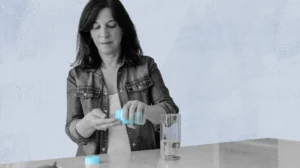
Menstrual cups are a little-known reusable feminine hygiene product that promotes numerous benefits. Much like a tampon, menstrual cups are inserted into the vagina during a period, however, they can remain in the vagina for extended periods (no pun intended). Not only that, but they are a far more sustainable option that is better for both you and the environment.
Sadly, despite their undeniable benefits, however, The Financial Express explains that only .3% of women in the U.S. use menstrual cups. After you read this blog, we believe that number is likely to grow. Read below to learn about how menstrual cups could shake up your menstrual health.
How Do Menstrual Cups Work?
Menstrual cups are small and flexible and are often comprised of silicone or latex rubber. They catch and collect your period flow rather than absorbing it like a pad or tampon. To use it effectively, it should be inserted just before your period by folding it tightly and inserting it much like you would a tampon without an applicator. According to WebMD, while some may be afraid of using a menstrual cup for fear of discomfort, you shouldn’t feel them at all when used correctly. Using a menstrual cup is comparable to putting a diaphragm or birth control ring in place.

Once in place, your menstrual cup will spring open and rest against the vaginal walls, ultimately preventing any leakage. While some period cups are disposable, the majority are reusable and can be sterilized with soap and hot water prior to your next period. If you’re wondering where you can find menstrual cups, they are conveniently available both online and over the counter at your local pharmacy.
What are The Benefits of a Menstrual Cup?
While we touched on a few benefits regarding the use of a menstrual cup, there are many more of which you should be aware. Continue reading to learn more.
They are Eco-Friendly
Pads and tampons are not environmentally friendly as they easily pile up in landfills and take up to six months to break down fully, as reported by Natracare. With a menstrual cup, on the other hand, those that are disposable are most often biodegradable and, as we mentioned earlier, many are reusable. So, in the long-run menstrual cups are a great, mutually beneficial way to decrease your impact on the environment.
It Can Stay in Place for 12 Hours
As you’re likely aware, tampons MUST be changed every 4-8 hours to prevent TSS (Toxic Shock Syndrome). This can, of course, be problematic as it can easily compromise your schedule. However, menstrual cups can remain in place for up to 12 hours depending on your flow, ultimately reducing any related stress and allowing you to get through the day comfortably.
They are Cost-Effective
Here’s a surprising fact for you: the average reusable menstrual cup costs around $30-$40, and most are designed to last up to 10 years! Just imagine the amount of money you could make by switching!

Menstrual Cups Hold More Than Other Products
A super-absorbent tampon or pad is only capable of holding HALF of the blood a menstrual cup can hold. If you think about it, this could go a long way toward comforting you on days when you have a heavy flow.
Enjoy Mess-Free Sex
While not all menstrual cups can be left in the vagina during sex, there are several different soft, flexible options out there that are designed with sex in mind. Shaped like a dome rather than the typical bell, neither you nor your partner will be able to feel them during intercourse PLUS there’s no blood getting in the way!
There’s Less Period-Related Odor
When menstrual blood is exposed to air, it tends to start smelling unpleasant. Luckily, a menstrual cup is capable of forming a tight seal so you never have to worry about this issue again.
Menstrual Cups are Better for Your Vagina!
You should never neglect your sexual (and reproductive) health and wellness. And, as it turns out, menstrual cups are also better for your vagina than tampons. In fact, Healthnews explains that they come highly recommended by gynecology experts around the world. Because not only are they affordable, eco-friendly, comfortable, and sustainable, but they are better for your health. Specifically speaking, they eliminate your chances of getting TSS–a rare bacterial infection associated with the use of tampons.

If you’d like to try a menstrual cup on your next period, visit your local pharmacist to obtain one that’s right for you as well as get answers to any additional questions you might have. And, in the meantime, remember to contact one of our 24-7Labs locations for quick, convenient health testing on your schedule



